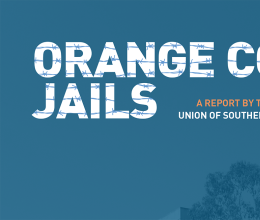The ACLU of Southern California (ACLU/SC), the law firm Bird Marella, Harvard Law Professor Charles Ogletree, and USC Law Professor Michael Brennan have filed an amended complaint that drops claims against the Los Angeles County Sheriff’s Department that were included in a lawsuit filed against county officials challenging polices that systematically suppress evidence favorable to criminal defendants. The announcement comes after the department disclosed, shortly after the lawsuit was filed, that it had adopted new policies governing how it archives information surrounding incidents of deputy-on-inmate violence in L.A. County jails.
ACLU/SC and its co-counsel filed Douglas v. Cooley in July, alleging that Sheriff Lee Baca had adopted policies and practices that systematically conceal evidence of deputy assaults on Men’s Central Jail detainees from criminal defense counsel in cases where these deputies will testify as witnesses, in clear violation of state law. In 1978, the California Legislature required that law enforcement agencies include citizen complaints against police officers and sheriff’s deputies in the officer’s personnel file or a database that can be searched by the officer’s name to ensure that a defendant can access relevant evidence of past officer misconduct that could cast doubt on any testimony the officer might give in a criminal trial.
Earlier this year, an LASD representative testified in court that the department does not track complaints against deputies by jail inmates in a searchable database, so searching for incidents by a deputy’s name was impossible. But in a September 6 sworn statement provided to ACLU/SC by the sheriff’s department, LASD custodian of records Judy Gerhardt testified that as of July 25, the department had implemented a new system of reporting and tracking complaints against deputies by employee number and name and also had manually reviewed inmate complaints from the past five years to ensure that relevant complaints were added to the database as the law requires. The department also agreed to notify local defense attorneys about the new policy so attorneys whose clients have pending cases know that they can renew their requests and may receive information that had been withheld under the old policy.
“Because Sheriff Baca and his department have adopted the changes that we urged and are now in compliance with the law, there is no need to proceed with those claims,” said Peter Eliasberg, ACLU/SC legal director. “Finally, after many years of obstruction by the sheriff’s department, it decided to comply with the law and ensure that criminal defendants receive the evidence to which they are entitled by state law and the Constitution. We appreciate the seriousness with which counsel for the LASD have taken our concerns and worked to bring about these long overdue changes in department protocol and practice.”
The adoption of the new policy comes following revelations that two of the department’s oversight bodies, the Office of Independent Review and the Special Counsel, had separately advised the changes to the illegal policy at least as early as 2003, and that the department had assured both of them that it had done so. The adoption of the new policy in July confirms that the assurances it had provided to OIR and the Special Counsel were false.
“We said at the outset of this case that we were seeking nothing more than that the sheriff’s department stop breaking the law,” said Benjamin Gluck, a partner at Bird Marella. “Now that we have ensured they will obey the law, we have dropped them from this lawsuit. But it is unfortunate that it took a lawsuit and the threat of the threat of deposing the sheriff under oath to accomplish this.”
“The sheriff’s department’s agreement to notify local defense attorneys about the new policy is a critical step forward, but it is troubling that we may never know how many criminal defendants may have received unfair trials or been wrongly convicted over the last several decades,” said David Sapp, an ACLU/SC staff attorney.
The lawsuit also includes claims against the Los Angeles District Attorney’s Office for preventing or prohibiting disclosure of favorable evidence to criminal defendants, in violation of state and federal law. Now that the amended complaint has been filed, the claims against the District Attorney’s Office will proceed.
